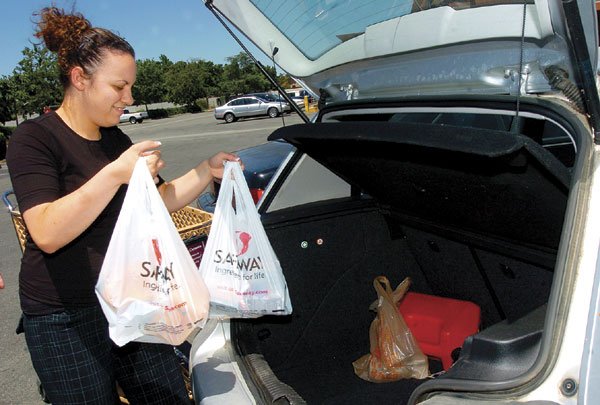Plastic bags may soon vanish from local grocery stores if the
city joins an ecofriendly trend sweeping the country.
Gilroy – Plastic bags may soon vanish from local grocery stores if the city joins an ecofriendly trend sweeping the country.
The virtues of replacing plastic bags – blamed for killing sea life and cluttering landfills – will be discussed by council members Friday during a day of informal policy talks. The conversation places Gilroy at the heart of efforts across the nation that target everything from Styrofoam containers to plastic bags and cutlery.
San Francisco, which in March became the first major city in America to ban petroleum-based plastic bags, has sparked similar conversations in cities such as Oakland, Seattle and Roanoke, Virg.
A peculiar set of gripes motivated Councilman Dion Bracco to raise the issue in Gilroy.
“If you drive around you see those bags. They’re everywhere,” Bracco said. “They’re blowing in the street. They’re in bushes, and I guess they don’t decay in the landfill.”
Bracco, who requests paper bags at the grocery check-out or brings tote bags from past trips, said residents have given him an “earful” over the issue in recent months.
The most vocal advocates of banning plastic include Sheila Foote, 76, and a number of her neighbors at Sunset Gardens, a senior citizen complex at Third Street and Wren Avenue.
“Let’s save the Earth,” Foote said. “The stores can get into disposable plastic bags that won’t take 20 years to disappear at the garbage dump … There are other ways that they can go.”
A new state law requires grocery stores this month to adopt more ecofriendly practices. Stores with more than $2 million in annual sales or measuring 10,000 square feet or more are required to offer recycling bins for plastic bags and to sell re-usable “tote” bags.
The Safeway store on First Street doles out roughly 30,000 plastic bags and 3,000 paper ones each week, according to the store’s inventory clerk. Since the law took effect, the store has seen a pair of 55-gallon recycling bins fill up with plastic bags every two days, according to assistant store manager Kimberly Hansen.
An increasing number of people also are purchasing 99 cent tote bags, available for sale near check-out lines, Hansen added. The bags quickly pay for themselves, since customers receive 10 cents off their bill for every reusable bag they fill with groceries.
“I’m surprised at how much it sells,” said Hansen, who supports the switch to paper and tote bags. “Come on man. It’s 2007 … We’ve got to do something. We have a younger generation of people coming up that we have to think of.”
Nob Hill grocery also sells tote bags and pays customers five cents for every paper bag they return.
An increasing number of grocery stores are going beyond the minimum requirements of the new state law and adopting such practices, according to Dave Heylen, spokesman for the California Grocers Association. The trade group representing more than 500 state grocery chains has faced increasing pressure to adopt new bagging practices. In addition to recycling and re-usable bags, the group is pushing members to train employees to pack more efficiently and avoid double-bagging.
The group remains cautious about the model adopted in San Francisco, where officials passed a ban on all petroleum-based bags at grocery stores and pharmacy chains, but will continue to allow biodegradable plastic and paper bags. The San Francisco law allows big-box stores such as Best Buy and Target to continue using plastic bags, an approach that portends a logistical nightmare, Heylen said.
“Now you’re asking a consumer to track which bags are compostable or not,” he said. “In the recycling process, you can’t mix the two… (By forcing people to sort), you’re frustrating this whole effort.”
He also suggested that such a policy could lead to higher costs, which in turn could get passed on to consumers. The standard petroleum-based plastic bag costs a penny or two per bag, compared to four cents for a paper bag and seven to 10 cents for bio-degradable plastic bags, according to Heylen.
Mayor Al Pinheiro said he does not have a position on the matter yet, though he questioned San Francisco’s decision to force grocery stores and pharmacies to give up plastic bags while exempting big box stores.
“I would think that when you try to do a law, you try to make it equitable for all and fair for all,” he said. “I would have to hear all the reasons why you would make some ban it and others not.”
The ban on plastic bags sounded like a good idea to Laura Simmons, a 52-year-old veterinarian packing groceries into her car Monday afternoon. She said she normally chooses paper, but ended up with plastic because the Safeway clerk forgot to offer an alternative.
“If we could have biodegradable bags that would be great. Or at least paper,” Simmons said. “They usually put two things in a double bag and hand it to you. It’s such a waste.”














